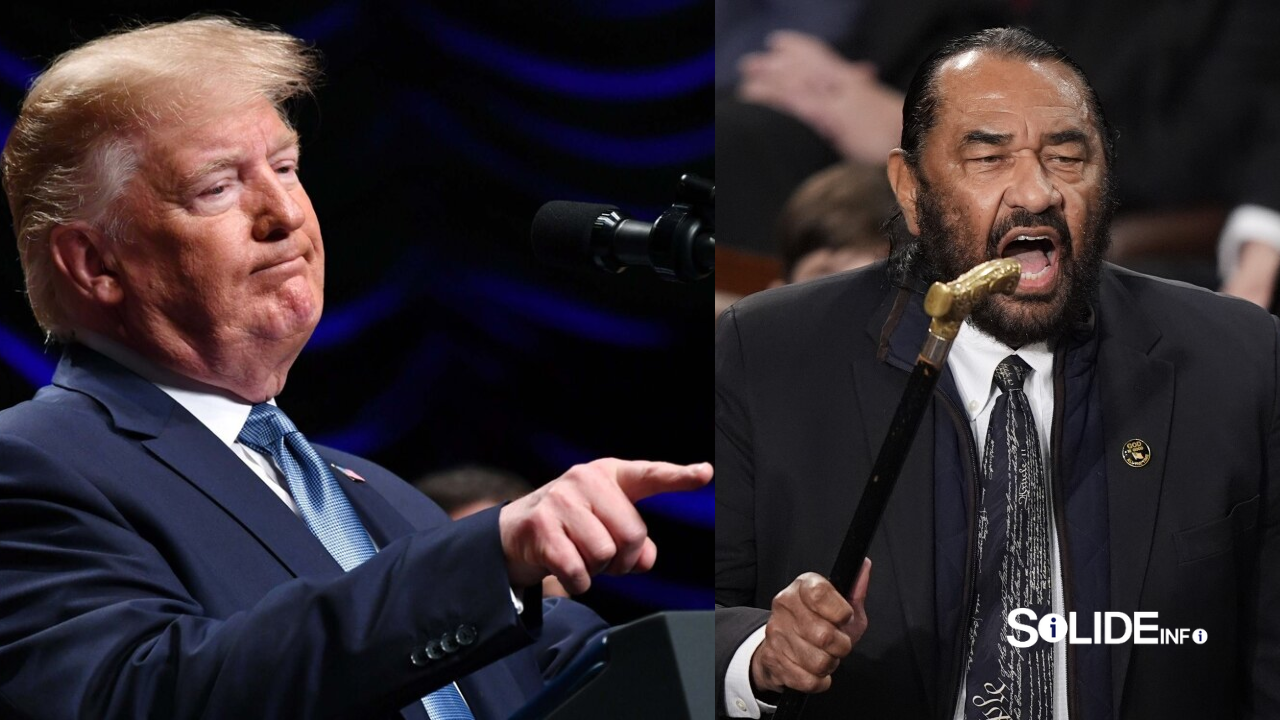The opening weeks of the 2025 congressional session felt less like a legislative process and more like a collision of worlds. On one side stood Rep. Al Green, the Texas Democrat whose unflinching advocacy for Palestinian rights, Muslim communities, and voting reforms has defined his career. On the other, a resurgent bloc of Trump-aligned lawmakers, armed with an “America First” playbook promising stricter immigration controls, unwavering support for Israel, and a skepticism of global alliances. The tension between these visions isn’t just political—it’s personal, ideological, and increasingly existential for America’s role in a fractured world.
Clash of Visions: Human Rights vs. “America First”

At the heart of the 2025 debate is a fundamental question: Should U.S. policy prioritize hardline security measures or human rights-driven diplomacy? Trump allies have doubled down on policies like freezing refugee admissions, expanding border walls, and fast-tracking military aid to Israel without human rights conditions. Green, meanwhile, has emerged as a vocal dissenter. During a heated House floor speech, he condemned the GOP’s proposed aid package to Israel as “funding trauma,” citing UN reports of Palestinian civilian casualties. “We cannot preach democracy abroad while ignoring the cries of the oppressed,” he argued, drawing cheers from progressive caucus members—and eye rolls from conservatives.
The divide extends beyond geopolitics. While Trump’s camp pushes voter ID laws they claim “prevent fraud,” Green has introduced legislation to restore Voting Rights Act protections gutted by the Supreme Court. “Democracy isn’t a slogan,” he told reporters. “It’s making sure a single mom in Houston has the same voting access as a Wall Street CEO.” For Trump loyalists, such rhetoric misses the point. “Rep. Green is obsessed with fringe issues,” one GOP congressman fired back. “Americans want security, not lectures.”
Palestinian Statehood: A Lightning Rod in U.S. Politics

No issue underscores the Green-Trump schism more sharply than Palestine. Green, one of few Democrats to openly endorse Palestinian statehood, recently co-sponsored a resolution urging Biden to condition military aid on Israel halting West Bank settlements. The move drew praise from groups like Jewish Voice for Peace but ignited fury among pro-Israel Republicans. “This isn’t just anti-Israel—it’s anti-American,” claimed a Trump-endorsed freshman representative, echoing the former president’s stance that “Israel’s enemies are our enemies.”
Green remains unmoved. At a town hall in his Houston district, he framed the issue through the lens of his civil rights roots. “I’ve seen what happens when people are treated as second-class citizens,” he said, referencing his childhood in segregated Louisiana. “Oppression anywhere threatens justice everywhere.” His words resonate with young progressives and Muslim-American voters but risk alienating moderates. Even some Democrats worry his stance could weaken bipartisan support for Israel. Still, Green insists the U.S. must “balance loyalty to allies with loyalty to our values.”
Democracy on the Line: Voting Rights and Immigrant Voices
The 2025 agenda’s domestic battles are equally charged. Trump-aligned lawmakers have prioritized bills requiring proof of citizenship to vote, limiting mail-in ballots, and empowering states to purge voter rolls—measures Green calls “voter suppression dressed in patriotism.” He’s countered with proposals to automatically register voters, restore felon voting rights, and federally fund election security. “Democracy isn’t a game,” he declared at a D.C. rally. “It’s the oxygen of a free society.”
Immigration policy further fuels the fire. While Republicans push to reinstate Trump-era travel bans targeting Muslim-majority nations, Green has amplified stories of asylum-seeking families separated at the border. “We’re criminalizing desperation,” he argued during a Judiciary Committee hearing, flanked by faith leaders and immigration attorneys. His efforts to halt deportations of Palestinian refugees facing violence abroad have become a rallying cry for activists—and a target for conservatives accusing him of “putting foreign nationals before Americans.”
The Personal in the Political: A History of Confrontation
This isn’t the first time Green and Trump have been at odds. In 2017, Green became the first Democrat to call for Trump’s impeachment, citing the former president’s response to a white supremacist rally in Charlottesville. “You cannot condemn bigotry on one hand and empower it with the other,” Green said at the time. Trump dismissed him as a “grandstanding radical,” but the feud has only deepened.
Today, Green sees Trump’s 2025 agenda as an escalation of past grievances. “This isn’t policy—it’s punishment,” he said recently, referencing GOP efforts to defund programs aiding Muslim and immigrant communities. Meanwhile, Trump’s allies paint Green as a relic of “woke globalism,” out of touch with working-class concerns. Yet in an era where politics often feels performative, Green’s willingness to stake his career on polarizing issues has earned him a unique credibility. As one Palestinian-American activist put it: “He’s not just an ally; he’s a lifeline.”
The Road Ahead
As the 2025 session unfolds, Green’s clashes with Trump’s vision will likely intensify—and not just in Congress. With Trump hinting at another presidential run, and Green eyeing a 12th House term, their duel symbolizes a broader fight over America’s soul. Can a nation reconcile security with compassion? Can it champion democracy abroad while dismantling barriers at home?
For now, Green seems content to keep asking the questions others avoid. “I didn’t come to Congress to make friends,” he told a reporter recently. “I came to make justice.” In a capital increasingly defined by soundbites, his words feel less like a slogan and more like a challenge—one that could redefine what American leadership means in a divided world.
This article is for informational purposes only and should not be considered professional advice.



